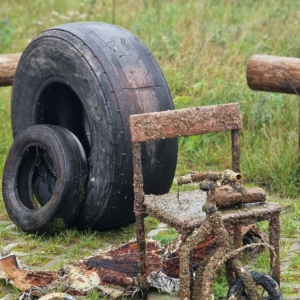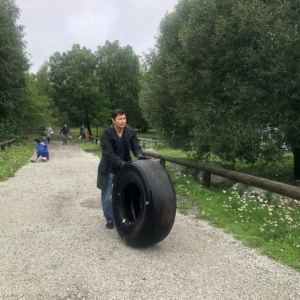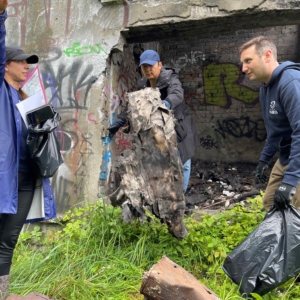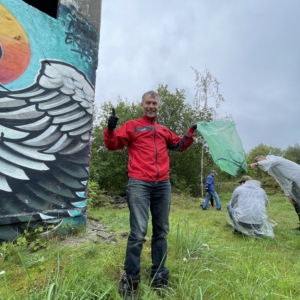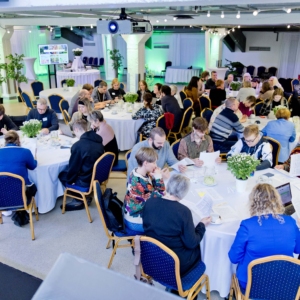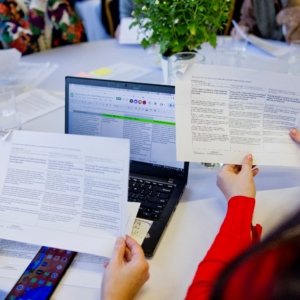Let’s create together
In the year of the Green Capital, Tallinn created non-profit support for initiatives that enrich and value the living environment. After three rounds, more than 100 applications were received and almost half of them received support. In total, Tallinn, the Green Capital of Europe, supported 49 environmental projects with more than one million euros.
Tallinn set a goal to involve the widest possible range of people from Tallinn and Estonia in the year of the European Green Capital, and the support of non-profit initiatives was a good way to support the sustainable ideas of the people of Tallinn.
The aim of the committee was to select projects that would have the greatest possible impact and in as many different fields as possible, and that would fit the European Green Capital program or support the “Green Tracks” project.
Projects supported in the first round:
VARIOUS URBAN INTERVENTIONS BY THE UNION OF ESTONIAN ARCHITECTS, 01.07-01.10
From June to September, a temporary park emerged in Town Hall Square, offering visitors seating and various activities while temporarily revitalizing the square with landscaping and spatial objects. The task given to (landscape) architects was to create flexible objects (or use ready-made products) that could be used in the following years and would engage in a spatial dialogue with the square’s summer event program.
The Estonian Association of Architects received €100,000 in support for conducting various urban interventions in the urban space of Tallinn.
CONFERENCE “PARATERRANEAN NETWORKS”, 11.-13.05
From May 11 to 13, the Biotoopia conference held at the Botanic Garden presented new thought patterns about the mystical paraterranean networks and their instructive messages to society. The keynote speaker for the conference was the renowned biologist and bestselling author Merlin Sheldrake from the United Kingdom.
The main theme of this year’s Biotoopia conference was the underground networks, going beyond introducing the soil as a more species-rich part of the biosphere. Biotoopia encouraged participants to engage actively in discussions and posed rather unconventional questions, such as how fungi influence ant behavior through chemical compounds, whether the human brain is confined only within the skull, and whether the future is a fixed destination to march toward with determined purpose.
The Estonian Anthropocene Center NGO received €34,000 for organizing the international Biotoopia conference “Paraterranean Networks” at the Tallinn Botanic Garden and online.
EXHIBITION “LET’S GO ZERO!”, 01.09-31.12
The goal of the exhibition “Let’s Go Zero!” was to visually convey the nature of waste, the magnitude of the problem, and offer solutions through impactful metaphors. Visitors could view and interact with exhibits to gain an understanding of the circular economy and the possibilities of material recycling.
- Informational texts were printed on scrap paper from the printing press.
- Exhibit bases were made from residual materials obtained from various construction sites.
- The creation of the exhibits involved collecting “waste” from businesses and individuals.
The NGO Let’s Go Zero received 39,200 euros for organizing the exhibition “Let’s Go Zero!” on the topic of the circular economy.
GREEN AND SUSTAINABLE MAY RUN, 20.05
In the European Green Capital 2023, the innovative medals for Estonia’s largest women’s sport event this year were inspired by environmental conservation and biodiversity. The participation medals were made of seed paper, which everyone could later plant in a suitable location.
All participants who completed the seven-kilometer main distance of the LHV May Run, the three-kilometer Rimi Girl’s run, or took part in the Limpa children’s run received a separately designed seed paper medal with a unique logo. In addition to these novel participation medals distributed as a pilot project, the LHV May Run event in the European Green Capital Tallinn implemented environmentally friendly event guidelines. Reusable tableware and drink cups from the recycling company Ringo Eco were also utilized.
The NGO Liikuv Eesti received a grant of 27,000 euros for organizing the green and environmentally friendly May Run, including the innovative plan to distribute seed paper medals to participants.
LOGI COMMUNITY SAUNA IN TALLINN, 15.15.2023
The newest sauna in Tallinn, Logi community sauna, is a citizen-initiated wood-fired seaside sauna. The construction was supported by Tallinn through the “Let’s create together” grant of the Green Capital. Logi community sauna is located by the sea, in close proximity to the City Hall (address: Logi 13), and in addition to the sauna, it offers opportunities for winter swimming and various leisure activities in the summer. The sauna itself is open from Friday to Sunday. Operating with direct support from local community members and volunteers, the sauna promotes significant social involvement. It is also sustainable, being heated with a wood-burning stove and lacking an electrical connection.
For information about the opening hours and rules of Logi community sauna, please visit logisaun.ee
The NGO “Kuum ja Külm” received funding of 53,634 euros to establish the Logi community sauna near Linnahall.
Projects supported in the second round:
INSTALLATION “BEING TOGETHER”, 03.06-30.09
The project “Being Together” by Superscape OÜ received 4,235.5 euros to create a green installation in the Põhjala Factory.
PROJECT “PERMACULTURAL TALLINN”, 11.09
The project “Permacultural Tallinn” by Wildernet OÜ received 6,000 euros for conducting training and workshops in educational and community gardens.
PROJECT “URBANINSECTA”, 04.07
OÜ Cappo received 30,000 euros for the “URBANINSECTA” project, which created large insect hotels in different cities to draw attention to insects as a unique part of urban nature and emphasize their importance in the ecosystem.
Urbaninsecta, or insect walls, serve as a rich habitat, providing living space for insects and smaller warm-blooded animals. It is an environment created to support life, reproduction, and hibernation.
These modular insect hotels were designed with a unified design scheme, ensuring that no two are exactly alike. The components vary within each layer, showcasing a combination of plant-based materials in the filling of the upper layer and natural stones and leaf litter from deciduous trees in the lower layer. The design aimed to highlight the importance of biodiverse living environments and the significance of nature’s diversity in urban spaces.
Explore the Urbaninsectas on the “Green Tracks” map here.
PROJECT “KASSISABA BUCKET GARDENS”, 01.-14.05
Kassisaba Selts received 3,253 euros for the project “Kassisaba Bucket Gardens,” where the planting was inspired by Tallinn’s rich greenery catalog.
In the spring, Kassisaba Selts used the rich greenery catalog of Tallinn city as inspiration for planting bucket gardens.
POCKET FORRESTS, 04.06
The main goal of the space created on Faehlmann Street in Tallinn’s city center was to raise public awareness of environmental sustainability. Instead of measuring square meters, the project used the scale of parking lot size, which is comparable, easily replicable, and scalable. Different surfaces in the outdoor space depicted various possible plant species’ combinations, which, in turn, increased pollinator abundance and improved soil quality. The overall objective was to create a vigorously evolving and enriched ecosystem.
The members of the Pocket Forrest team were landscape architect and designer Maali Roomet-Alles; landscape architect György Jakabfi; media and graphic designer Márta Csige.
FUTU OÜ received 19,350 euros for the project to create pocket parks in the urban space of Tallinn.
SPECIAL PROGRAM OF JAFF “GREEN CARPET”, AUGUST 2023
The Japanese Anime Film Festival (NGO J-Tsoon) received 1780 euros to draw attention to nature and energy resource conservation with a special program called “Green Carpet.”
In alignment with the environmental interests of the city, the festival organizers replaced the usual red carpet with a green one during the festival opening, mirroring a tradition that started ten years ago at the Tokyo Film Festival. The carpet was special, crafted by artisans from Central Asia using ecologically clean organic materials.
To minimize printed materials, the organizers made festival catalogs available digitally and used QR codes on specially crafted brochures made from eco-friendly paper, containing flower seeds that attendees could plant and grow later.
STUDENT COMPANIES EVENT GRANT, 04.10
Junior Achivement Estonia foundation received a grant of 7,700 euros for the student companies event to provide 40 young people with knowledge and skills on how to make their living environment, especially our capital city, greener and a more nature- and human-friendly place.
ECO-FRIENDLY CHOICES IN FOOD CULTURE, 01.-07.11
The Tallinn Restaurant Week project received 25,600 euros to raise awareness of environmentally friendly choices in restaurant and food culture.
From November 1 to 7, Tallinn hosted a restaurant week where 81 restaurants offered culinary experiences to visitors. In collaboration with Tallinn, criteria were established to help restaurants choose a dish from the à la carte menu that met certain criteria and label it with the corresponding green label. This time, 24 restaurants joined the initiative for the first time.
ECO-FRIENDLY ACTIVITIES AT A MUSIC FESTIVAL, 10.-14.05
Tallinn Music Week (Shiftworks OÜ) received 8,785 euros to implement various environmentally friendly activities at this year’s festival, including the Estonian music industry’s green pact manifesto.
In collaboration between Tallinn Music Week (TMW), the Viljandi Folk Music Festival, and the UNESCO Music City Tallinn, a green rider for the music industry and guidelines for implementing sustainable development goals were developed. The project’s opening discussion took place on April 6 at the Estonian Music Market Focus Day.
The project focused on promoting sustainable and environmentally friendly cultural management and tourism in Estonia. As a result, guidelines for organizing environmentally friendly music events compatible with the UN’s sustainable development goals were developed, along with a value proposition for sustainable music tourism for the Tallinn music sector.
As part of the project, a survey on current environmentally friendly solutions and future possibilities was conducted among Estonian music organizations. In addition, both good examples and challenges in the field were identified through roundtable discussions with domestic and international experts.
Projects supported in the third round:
BALANCED ECONOMY CONFERENCE “ELEPHANT IN THE ROOM”, 17.11
The “Elephant in the Room” forum wanted to encourage Estonian decision-makers to look for and implement new models. Leaders of change, entrepreneurs and public sector leaders were expected to join who wanted to have a say in shaping the economic environment of the future. The event was aimed at everyone who believe that the green revolution is a great opportunity and a question of competitiveness for the Estonian economy and people. The conference was organized by SA Rohetiiger.
More information can be found here: https://greentallinn.eu/en/events/elephant-in-the-room/
SA Rohetiiger received 30,000 euros to organize the “Elephant in the Room” conference on the Balanced economy.
PROJECT “RECYCLE WHILE CYCLING”, 25.06, 30.07, 26.08
“Recycle while cycling” – Precious Plastic Estonia was a community initiative in Tallinn focused on recycling plastic.
The main goal was to engage a wide audience and demonstrate that the process of shredding plastic, a crucial step in plastic recycling, can be engaging and enjoyable.
For this project, a plastic shredder was built, powered by a bicycle. This unique machine breaks down plastic into smaller pieces using the pedaling force.
Precious Plastic Estonia received 2,900 euros for the project “Recycle while cycling”.
PROJECT “SAVE OUR SEA”, 31.08-16.09
A campaign aimed at cleaning up small litter from the shores of Baltic Sea region cities, such as picking up cigarette butts from water bodies and coastal areas. This was done in collaboration with the city of Helsinki, Let’s Do It World, and other partners.
The campaign took place from August 31 to September 16, starting with the Baltic Sea Day and ending with World Cleanup Day. The goal was to draw attention to the increasingly critical state of the Baltic Sea and to urge cities and residents along the Baltic Sea to collectively protect and preserve it.
Over 156,000 participants took part in the campaign. There were 91 cleanup actions, involving 45 municipalities and 10 countries and territories: Estonia, Latvia, Lithuania, Finland, Denmark, Germany, Poland, Sweden, Åland Islands, and Belgium.
On World Cleanup Day, globally, 19.1 million participants cleaned up 205,000 tons of waste. In Estonia, 56,000 participants took part.
The NGO Let’s Do It World received 150,000 euros for the project “Clean and Alive Baltic Sea,” which organized a large international campaign to clean up small litter from the Baltic Sea.
More information can be found here.
TEACHING ABOUT BEEKEEPING IN TALLINN’S EDUCATIONAL INSTITUTIONS, 31.05-30.06
Tallinn Beekeepers Society received 6,800 euros to teach about beekeeping in Tallinn’s educational institutions.
YOUTH SONG AND DANCE FESTIVAL, 30.06-02.07
In support of the use of reusable dishes at the youth song and dance festival in June 2023, the Estonian Song and Dance Celebration Foundation received a grant of 27,000 euros.
The festival took place from June 30 to July 2, 2023, bringing together approximately 350,000 participants and visitors from both Estonia and abroad. In collaboration with Tallinn – the European Green Capital, environmentally friendly criteria were implemented for the first time at such a large event in Estonia. The goal was to keep the festival’s ecological footprint as small as possible and to use local raw materials and resources whenever possible. The same principles were applied to the event’s partners and suppliers who contributed to the realization of the celebration.
More information here.
EXHIBITION “RELAY STICK FROM KÜTIORG TO KADRIORG. POWER” AND PUBLIC PROGRAM “POWER, HUMAN AND NATURE”, 07.-08.09
The University of Tartu received 5,649 euros for the public program “Power, Man, and Nature” associated with the exhibition “Relay stick from Kütioru to Kadriorg. Power.”
During the exhibition “Power” held in Kadriorg Park and the Kadriorg Art Museum, semioticians, artists, literature and cultural scholars engaged in discussions regarding the meaningfulness of the (natural) environment and the power relations between humans and nature.
The “Power” exhibition was the final stop of the trilogy “Teatepulk from Kütioru to Kadriorg. Power. Spirit. Power.” The exhibition featured reflections on the theme of power by 13 artists through installations and sculptures in Kadriorg Park and the Kadriorg Art Museum. The public program was organized by the Semiotics Applied Center at the University of Tartu.
LOGI COMMUNITY SAUNA IN TALLINN, 15.15.2023
The newest sauna in Tallinn, Logi community sauna, is a citizen-initiated wood-fired seaside sauna. The construction was supported by Tallinn through the “Let’s create together” grant of the Green Capital. Logi community sauna is located by the sea, in close proximity to the City Hall (address: Logi 13), and in addition to the sauna, it offers opportunities for winter swimming and various leisure activities in the summer. The sauna itself is open from Friday to Sunday. Operating with direct support from local community members and volunteers, the sauna promotes significant social involvement. It is also sustainable, being heated with a wood-burning stove and lacking an electrical connection.
For information about the opening hours and rules of Logi community sauna, please visit logisaun.ee
The NGO Kuum ja Külm received 12,024 euros in additional funding for the creation of the Logi community sauna in the port area of Tallinn near the city hall.
INNOVATION COMPETITION CLIMATHON, 27.10
Cleantech Estonia invited all interested parties to participate in the 24-hour Climathon, which took place on October 27-28 at TalTech’s Innovation Center Mektory. The goal of the hackathon was to find innovative solutions to urban climate problems and contribute to creating a more sustainable urban environment. Participants could join with existing ideas or simply come to explore and find a team and idea to contribute to. The best teams were supported with financial and non-financial rewards to further develop their ideas.
The non-profit organization Cleantech ForEst received 12,795 euros for organizing Climathon, an innovation competition focused on solving climate problems.
CITIZENS’ ASSEMBLY, 07.10-04.11
This year, from October 7th to November 4th, Tallinn hosted its first Green Capital Citizens’ Assembly. The city government invited residents to answer the question “How to connect Tallinn’s green areas into an inviting citywide whole?” with the help of experts and interest groups.
Over two weekends, assembly representatives received knowledge from experts and interest groups, including the city of Tallinn, on topics such as biodiversity, urban nature, space, and climate change. They formulated 70 initial proposals. Before the final meeting, these proposals were reviewed in collaboration with experts and city officials. The wording of the proposals was clarified, similar ideas were consolidated, and on Saturday morning, 44 proposals were on the Citizens’ Assembly table. In the final vote, 39 proposals received at least 80% support from the representatives, meaning they were accepted by the Citizens’ Assembly and handed over to the city.
The Citizens’ Assembly proposals will be published on the website greentallinn.ee/rahvakogu/en, where the city will provide ongoing information about the progress of the proposals until the end of 2024.
The Science and Culture Foundation Domus Dorpatensis received 33,518 euros to organize Tallinn’s first People’s Assembly in the fall.
More information can be found here: https://onlineexpo.com/en/rahvakogu/
SUSTAINABILITY AND ENVIRONMENTAL LECTURES “ONE WORLD”, 15.04
Actor and activist Henessi Schmidt received 4,965 euros to conduct lectures on sustainability and the environment at the “One World” event.
The Green Seminar was part of a full-day ONE WORLD charity global event, which was open for free participation to all interested individuals.
During the seminar, discussions focused on the misconceptions and failures of climate change, the circular economy, drinking water, and much more.
CIRCULAR DESIGN STUDIO “TRASH TO TREND”, 18.05
Trash to Trend is a repair and circular design studio focused on extending the lifespan of clothing and footwear, promoting sustainable consumption. The opening of Trash to Trend studio was a significant step for Tallinn towards a more sustainable future, fostering community engagement and providing an opportunity for everyone to participate in bringing the circular economy to life and promoting environmentally friendly consumption.
Fashion designer Reet Aus (Aus Mood OÜ) received 66,200 euros to create the circular design studio “Trash to Trend”.
More information here: https://www.reetaus.com/pages/trash-to-trend
TALLINN MARATHON AND 10K RUN, 08.-10.09
Tallinn Marathon – Estonia’s most participated international sports event. The medals of Estonia’s largest sports event included both components from old electronic devices and old vinyl records. Thus, old metal was given a new, dignified life. Tallinn is the first European capital where the participation medals for an international sports event were made from used consumer electronics waste.
The sustainable material production of the medals distributed to the participants was supported with 45,400 euros.
PROJECT “IN THE HOLLOW OF THE MAIDENHAIR TREES”, 10.04
As part of the Estonian Contemporary Art Museum‘s project “In the Hollow of the Maidenhair Trees,” three maidenhair trees were planted in the courtyard of the Estonian Contemporary Art Museum as a collective action. Artist Tanja Muravskaja and curator Margit Säde aimed to draw attention to the Estonian Contemporary Art Museum as an important place of resistance and remembrance, securing the future and space of EKKM by planting sacred trees. For a longer-term perspective, the artists proposed meeting under the trees again in 30 years to see how the trees have taken root and adapted over that time.
The Contemporary Art Museum of Estonia received 4,900 euros for the planting of maidenhair trees with the project “In the Hollow of the Maidenhair Trees”.
URBAN CHICKEN IN THE NORTH FACTORY, 01.06-15.09
The first community garden in Kopli, created in the urban garden of the Põhjala Factory, received an addition in the form of five urban chickens.
The NGO Põhjala factory received 500 euros for keeping urban chickens at the Põhjala factory.
PROJECT “CREATIVE FREE PLAY AREA IN URBAN SPACE”, 10.06
On June 10th, during the urban space festival “Tulevik on täna/v,” (“The future is today/a street“) a sustainable and inviting play area for citizens of all ages was constructed together with children and youth.
Utilizing wood materials from local parks, old ship fasteners obtained from the harbors, and other eco-friendly materials, young people had the opportunity to build an innovative and unique play area. This space is not only creative and fun but also interactive, fostering a connection with nature. The pilot version of the play area was featured during the June 10th to 18th urban space festival “Tulevik on täna/v” and was then permanently installed in the Kakumäe beach area. Young people of various ages contributed to the design of the play area during workshops held in April at Vivistop Telliskivi.
VIVITA Estonia OÜ received 6,840 euros for the project “Creative Free Play Area in Urban Space”.
More info here: Free Play Area
PROJECT “MODEL, THIS IS A STORY ABOUT SPACE”, 07.05-04.06
From May 7th to June 4th, the gallery street of Solaris Centre was filled with imaginative models created by Architecture School students.
The exhibition was a collaborative effort between Architecture School students and instructors, showcasing creative solutions from children and youth on topics related to urban space and living environments. The proposals from young people encouraged reflection on the desires and needs of city residents of different ages and how the daily choices of people living and moving around the city could contribute to making the living environment more pleasant and interesting. The models told stories about both urban spaces and homes, exploring how we live together and separately.
The NGO Ruumiharidus received 5,056 euros for the project “Model, this a story about space”.
PROJECT “THE BIRD AVIARY OF THE CAPITAL ON PALJASSAARE”, 02.05-30.09
As part of the project “The Bird Aviary of the Capital on Paljassaare,” the Paljassaare Bird Watching and Ringing Center was opened on September 6th at the Paljassaare conservation area.
As part of the project, the Tallinn Bird Club established the Paljassaare Bird Watching and Ringing Center. The aim was to spark interest among the residents of the capital in understanding and preserving nature. The center now has a mobile workshop and mist nets for round-the-clock use. Ornithologists from the Bird Club introduced how bird watching and ringing would take place. There was also a retrospective look at the Paljassaare bird conservation area.
The Tallinn Bird Club’s project “The Bird Aviary of the Capital on Paljassaare” was supported with 7,363 euros.
PROJECT “CONIFER TREE ADVENTURE. THE SECRET OF THE PINECONE”
Maria Strukova’s project “Conifer Adventure”. The secret of the pinecone” was allocated 1,000 euros.
LANDSCAPING IN THE ROTTERMANN QUARTER AND GREENERY IN TELLISKIVI CREATIVE CITY
Lush insect beds were planted in the Rotermann Quarter, supporting insect life in the heart of the city. The flower-rich beds include plants like meadow clary, yarrow, nettle, and other delightful species. “We consider flower-rich beds and green areas in city streets natural, even desirable. But flower beds can be made in a way that, in addition to uplifting human spirits, they bring joy to our tiny companions – insects. To achieve this, a little effort is needed – flower beds should contain more than one species of flowering plants. Even in a stone city where soil is scarce, we can create artificial flower beds. Without flowers, even human living spaces would be bleak,” says entomologist Urmas Tartes.
Rotermann City received 20,000 euros for the establishment of vibrant greenery in the Rottermann quarter, and Telliskivi Creative City (FG Food OÜ) received 20,000 euros for the creation of greenery.
INTERNATIONAL SUSTAINABILITY EVENT “IMPACT DAY 2023”, 05.-06.10
On the 5-6th of October, the largest impact sustainability festival in the Baltics, Impact Day, took place at the Põhjala factory, where individuals could find like-minded people, fresh ideas and knowledge on how to go even further with your words and actions.
More than 2,000 guests and more than 100 performers on 3 stages and 50+ organizations at the expo participated in the festival. Impact Day NGO received 5,000 euros for the marketing of the international sustainability event.
More information here: impactday.eu
PROJECT “TECHNOLOGY FESTIVAL OF CREATIVE ENGINEERS”, 28.-29.04
Exciting workshops, unique robotics competitions and a topical hydrogen-oriented conference awaited for all technology enthusiasts!
Tallinn City supported the project with 750 euros.
More information can be found here: https://www.litfestival.ee
SIMPLE SESSION URBAN SPACE EVENTS AND TOUR D’ÖÖ BICYCLE RIDES, 20.-26.09
On September 22nd, the beloved Tour d’ÖÖ 73rd ride took place, attracting over 2000 cyclists to the group ride. Tour d’ÖÖ events brought together cyclists from different walks of life with the goal of increasing the number of cyclists on the streets of Tallinn. In addition, the same weekend hosted the Simple Session extreme sports festival, where hundreds of cyclists and skateboarders from 30 countries participated in city events.
The non-profit organization Elamussport received 30,000 euros for organizing events in free urban space within the framework of Simple Session, and 10,000 euros for organizing the Tour d’ÖÖ Tallinn bicycle rides.
CONTEST OF NEWLOGISMS OF THE GREEN TRANSITION, 16.10-08.12
The Sõnaus contest of newlogisms, which began on October 16th, invited primarily young people to innovate the Estonian language and propose new equivalents for awkward and foreign words. In collaboration with Tallinn – European Green Capital program, the word collection focused on words related to the environment and the green shift.
Green-themed new words could be submitted from October 16th to November 30th. A commission of linguists made the first selection from the received words, which were then presented for public voting on the Sõnaus Facebook page from December 4th to 7th. Everyone could vote for their favorite, and finally, the commission chose the best words that comply with language rules. The results were announced on December 8th, the birthday of the renowned language innovator Johannes Aavik.
Sõnaus, a contest of newlogisms, was a joint initiative of the Office of the President and the Vabamu Museum and it was the third time such a contest took place.
Ede Schank Tamkivi received 12,270 euros for the competition of neologisms of the Green Transition.
PROJECT “GREEN CITY ENTREPRENEURIAL CHALLENGE”, November 2023
European Green Capital – Tallinn has set a goal for itself this year to bring the city closer to people, involve more individuals and businesses, various NGOs, and boost environmentally friendly initiatives. The theme of this year’s Roboliiga competition, “Minu autovaba linn” (My Car-Free City), was inspired by the Green Capital idea.
The Roboliiga competition served as a stepping stone for preschool and primary school students to enter the world of developmental robotics. Unlike other Robotex competitions, speed and power were not the key factors in Roboliiga; there were no first to third place winners. Instead, reaching Robotex was celebrated as an exciting learning journey for all participants, emphasizing teamwork, creativity, and the skill of programming an educational robot.
The NGO Robotex received 32,831 euros to organize the Green City Entrepreneurial Challenge.
STUDENT COMPETITION “MY GREEN CITY”, 01.10-25.11
Estonian STEM Non-formal Education Union received 22,860 euros for the organization of the student competition “My green city” in Minecraft.
SMART BEEHIVES, 01.-30.05
This is a green technology project by Tehnopol called “Tallinn Smart Beehives 2.0 in every city district government.”
Three experimental organic beehives are equipped with solar panels and a control system, and the activities in the smart beehive can be monitored in real-time on the internet. Each hive is equipped with sensors that measure temperature, humidity, light, carbon dioxide levels, noise, airborne organic compounds, and much more. The sensors transmit data and alert signals to the hive owners.
Smart beehives have been placed in city districts on the roofs and courtyards of buildings, contributing to an essential theme of the European Green Capital, the promotion of biodiversity.
SA Science and Business Park Tehnopol received 22,515 euros to cover the costs of building smart beehives in Pirita, Kristiine and Nõmme, including bee colonies, solar panels and data platforms.
PROJECT “OLD TOWN GARDEN QR PLANT CATALOG”, 03.06
On June 3rd, a QR plant catalog was launched in the Old Town Community Garden. The plant catalog serves as a “book” in the Old Town garden, introducing the medicinal plants of Hildegard of Bingen found in the garden. For the selected plants in the book, there are references in the garden in the form of QR codes, allowing visitors to quickly find and listen to the story about each plant. The stories are available in multiple languages.
The NGO Old Town Society received 11,500 euros for the “Old Town garden’s QR plant catalog” project.
PROJECT “ENVIRONMENTAL CARE IN SIMPLE TERMS”, 01.-30.06
The goal of the project was to raise the awareness of people with hearing loss in Tallinn about environmental protection and circular economy through accessible lectures and workshops. Within the framework of the project, two events were held, where people with hearing loss were provided translation services and technical aids to participate in lectures and workshops on environmental protection and circular economy.
The Estonian Association of the Hearing Impaired received 500 euros for the project.
More information can be found here: https://vaegkuuljad.ee/liidust/projektid/
THE PROJECT “GREEN NUDING FOR SPECIAL PEOPLE”, 01.06-30.11
The NGO Amanita received 10,500 euros for the project “Green Nudging for Special People”.
THE HOUSE OF DISABLED PEOPLE OF TALLINN, 18.06
The House of Disabled People of Tallinn received 40,260 euros for the construction of a garden for the senses.
More information can be found here: https://tallinnakoda.ee/meelteaed/
PROJECT “ENVIRONMENTALLY SMART APARTMENT ASSOCIATION”, 02.06
As part of the Estonian Apartment Association’s awareness program “Environmentally Smart Apartment Association,” a green conference took place on November 21st at the Tallinn Botanic Garden. The conference focused on discussions about designing a quality and sustainable outdoor area, comprehensive renovation of apartment buildings, the use of solar energy, and topics related to the circular economy. In addition to the conference, various excursions, roundtable discussions, and training sessions were organized throughout the year.
The Estonian Union Of Co-Operative Housing Association received 20,635 euros for the environmental education project “Environmentally Smart Apartment Association”.
More information here.
PÖFF’S SPECIAL PROGRAM OF ENVIRONMENTAL FILMS OF THE GREEN CAPITAL, 03.-19.11
At this year’s PÖFF (Black Nights Film Festival), Green Tallinn’s special environmental film program was introduced by the world premiere of the documentary film “Greener Tallinn” with original music, and the Chilean documentary film “I am the Earth”. The official opening of the special program on November 5th at 7:00 PM at Coca Cola Plaza featured the first public screening of the nature film “Greener Tallinn” by Joosep Matjus and Katri Rannastu, featuring original music “Seasons” by Tauno Aints. The Tallinn Chamber Orchestra, conducted by Tõnu Kaljuste, performed the music live. The film follows Tallinn’s urban nature and biodiversity throughout five seasons, from spring to spring, and was shot in 2022 and 2023.
In addition to Tallinn’s nature film, the environmental program included six other films that have garnered significant attention at international festivals this year. Following the screening of “Greener Tallinn,” the opening session presented the film “I am the Earth” (Chile). Other films in the program include “Songs of Earth” (Norway), the first documentary selected to represent its country at the Oscars in the foreign-language category, “Plastic Fantastic” (Germany), “Mighty Afrin: In the Times of Flood” (Greece, France), “Earth Protectors” (USA, Italy), and “Between the Rains” (Kenya).
PÖFF received 10,600 euros for the special program of environmental films of the green capital.
More information here.
Scenes from the film “Greener Tallinn”.
PROJECT “INTERVENTIONS OF THE ACTIVE SCHOOL WAY “, Autumn 2023
SA The Praxis Center for Policy Studies received 10,659 euros for the project “Interventions of the Active School Way”.


























